By Sr. Sheila Campbell MMM Ireland 01.04.2024
 Today is April 1st and Easter Monday. It is a nice kind of co-incidence. Although the origins of April Fool’s Day cannot be known for certain, some people believe that it originated in France. After the Council of Trent, France made the shift from the Julian Calendar, where the New Year began in Spring, to the Gregorian calendar that we use today (January 1st). So those who continued celebrating in the Spring were laughed at and called Fools. Other people think it began in England, much earlier than that, in the time of Chaucer.
Today is April 1st and Easter Monday. It is a nice kind of co-incidence. Although the origins of April Fool’s Day cannot be known for certain, some people believe that it originated in France. After the Council of Trent, France made the shift from the Julian Calendar, where the New Year began in Spring, to the Gregorian calendar that we use today (January 1st). So those who continued celebrating in the Spring were laughed at and called Fools. Other people think it began in England, much earlier than that, in the time of Chaucer.
No matter what its origins, Easter Monday is a call for us to make a new beginning. We have prepared ourselves during the season of Lent for this great feast. We acclaim in words and song, “Christ has risen!”.
Now we are away from our church services and back into daily life. This is when the fun begins. In some ways we believe and have experienced the Resurrection if we call ourselves Christian. From now on we are challenged to put that belief into our humdrum ordinary lives. I think it asks of us a positive attitude to life. Yes, there is evil in the world, there are wars and natural disasters, but deep down we know and trust that with the Resurrection everything has changed. Christ has risen not just for Himself and the Father, but to assure us that we too will overcome, will rise with him. I think this is a comforting message for us in times of bleakness. It is the rock to which we cling.
On a much lighter note, the other day I remembered a famous April Fool’s joke that the BBC played. It broadcast a film in their “Panorama” current affairs series purporting to show Swiss farmers picking freshly grown spaghetti, in what they called the Swiss spaghetti harvest. The BBC was soon flooded with requests to purchase a spaghetti plant, forcing them to declare the film a hoax on the main news the next day!!
I am always a sucker for April Fools jokes – I wonder what one I will fall for this year?
by Rev. Canon Susanna Gunner England 31.03.2024
Editor’s Note: This reflection was written in 2020, just as the pandemic was taking hold, and still relevant today. The image is from the Benedictine Sisters at Schotenhof, Belgium.
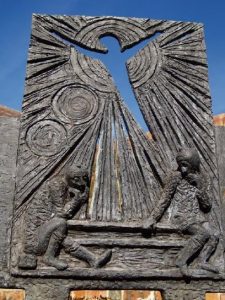 Take a moment to look at this sculpture made by Belgian nuns… We see two Roman guards in their boots and helmets and chainmail, sitting at either end of a stone grave slab, scratching their chins in disbelief, looking at where the body was and now is not. Carved into the bronze above them is a spiralling disc, rays emanating from it in all directions. And cut into the disc and its rays is the unmistakeable shape of a figure, head up, arms outstretched. But it is nothing but an outline against the bluest of blue skies. There is no actual figure, only the space where it has been and a wonderful sense of freedom.
Take a moment to look at this sculpture made by Belgian nuns… We see two Roman guards in their boots and helmets and chainmail, sitting at either end of a stone grave slab, scratching their chins in disbelief, looking at where the body was and now is not. Carved into the bronze above them is a spiralling disc, rays emanating from it in all directions. And cut into the disc and its rays is the unmistakeable shape of a figure, head up, arms outstretched. But it is nothing but an outline against the bluest of blue skies. There is no actual figure, only the space where it has been and a wonderful sense of freedom.
This sculpture teaches us something very profound: we cannot look at Jesus’ raised body, but we must somehow understand the world through it. The resurrection, says this sculpture, must be our viewfinder, through which we see everything else. In all four resurrection narratives, Jesus is constantly saying, “Don’t hang on to me now but go on, go ahead…” For the disciples, everything changes with the resurrection. They must start looking at Jesus, at themselves, at their lives and the future in new ways.
What do we see as we gaze at this sculpture in the context of coronavirus?
In rising from the dead, Jesus gives us not only the Christian hope that death is not the end. He also gives us a new world now full of the possibility of resurrection. He offers us our earthly lives transfigured by hope. Through the lens of his new risen life, everything looks different. Death, despair, disappointment, though still devastating, no longer have the last word. How might the frustrations and domestic tensions of lockdown be transfigured by looking at them through the viewfinder of Jesus’ new risen life? And what about illness and trauma and bereavement? The sharpened sense of our own mortality? And the markedly changed world in which our future lies?
Rev. Canon Susanna Gunner
Church of England Diocese of Norwich
Chaplain to His Majesty, the King
by Jo Doyle Ireland 30.03.2024
Inspired by an Ancient Homily in the Office of Readings.
 Something strange is happening. There is a great silence on earth today.
Something strange is happening. There is a great silence on earth today.
Christ was mortally wounded and died, and the earth shuddered.
These are some words that are helpful in this Holy Saturday descent.
Wounding, crisis, call, promise, transformation.
This reading explains the journey of these words. What is the call of such a great wounding?
Is there a meaning to our suffering?
In Greek the word ‘Wound’ means to pierce. Often we ignore, minimize or spiritualize our piercing and in that, we don’t recognize our call, not just to change but to participate in our transformation. We are asked on this day to enter our own piercing to receive something new.
Crisis is most often the only thing that will impel us to radical transformation.
We can try to stay neutral to our piercing or attend to the wound.
There has been so much activity on Holy Thursday and Good Friday that we don’t know what Holy Saturday in our lives is for. We pick daffodils, clean windows, prepare the leg of lamb to celebrate the Sunday Resurrection, yet we have not transformed, we may only have changed. Maybe we changed our jobs, houses, cars, countries, but this Saturday space is different.
We are invited to descend with him to join his wounding and piercing and in that darkness or crisis we are asked to wake up.
The Descent
Often we are wounded by a traumatic event. Not all traumatic events are evil, but some are. If you look at the book of Genesis where we are told not to touch the tree of good and evil. Its power is too much for us mere mortals. However, if the tree of evil steps out and touches us, what happens to our spirit and soul. We can be overwhelmed and only need to look to our Evening News to see the results.
Our wound opens and our pain ignites into bitterness and hatred, often we can be engorged in our own suffering and have notions of revenge. We can become so consumed with pain asking ‘Why?’ There is often no answer to why something happened, and we can become overpowered by darkness leading to addiction, depression, hopelessness or suicide. Another way is to follow the wound, travel into the Eye of God’s grief to experience the gaze of love. This descent into hell is experienced as the absence of love. It is a felt sense of being alone with grief, isolation, detachment and a felt sense of abandonment. In that desolate Holy Saturday place, Christ descended and waits to gaze on us, to pierce us with his Love and let us know from that moment on, that in our darkest moments we are not alone.
The Call
It may seem like an annihilation, but the promise of the wound is not annihilation but consummation with Christ. This is the promise of the Holy Saturday reading, our life’s journey into God. We are not just being taught that we are not alone but now we know it. God is with me is the gift of mystical union. What do I learn? The mystery of forgiveness, love, new purpose and the question,
‘Can anything good come from journeying the ‘Way of the wound?’
Remember, Resurrection happened in darkness, and nobody recognized Him when he rose from the dead.
Jo Wardhaugh Doyle is farming in Kildare with her husband Matt. She has worked in Uganda, Ethiopia and Kenya, but more recently has worked with Sr Rita Kelly MMM doing the REAP programme in the Irish Missionary Union (IMU).
by Jo Doyle Ireland 29.03.2024
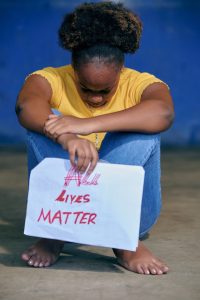 Gulu, Northern Uganda, June 1981
Gulu, Northern Uganda, June 1981
I saw him die, a brutal death.
Beaten by the soldiers chains and whips.
Unnecessary cruelty.
He was the wrong tribe. The tribe of Amin.
So he must be killed.
An innocent boy, living in a violent world that was just waiting for an excuse to hate, to be enraged.
Outrage, outrage! At being different.
No solace for anyone who does not fit in.
There were two of them, one dead already.
I felt the breathless fear of the other, waiting for that same outcome.
Such horror.
Death. Not yet.
“I am too young and innocent,” he whispers.
But no, he was different so must be killed.
The chains crashed into his head, his red blood screaming violence against his glistening black hair.
His vision blurring with disbelief that this could be happening to him.
His vision blurring by the blood and sweat of violence.
His vision blurring as his life began to drain away.
I stood at the side of the open-back Jeep, wanting to give him something. My hanky to wipe the destruction off his face. But my arms were lifeless, lost to fear.
I gave him all I had.
My eyes, my sight, my love.
We held each other’s gaze.
It was an unearned intimacy at a depth which imprinted life onto my soul.
He was murdered, caught in the gaze of my essence.
We shared a full lifetime in these few minutes.
Who was he? What was his name?
On reflection, years of un layering these few moments.
This was Good Friday.
An enactment of sorts.
The innocent Christ was dying in the arena of fear where no one stood beside him. There was one, a woman named Veronica.
An unknown anonymous woman. There is no mention of her, even in the Bible.
Although terrified, she reaches out. She sees the streaming blood fall on this man’s face and the unwarranted violence perpetuated. He had no friends on that journey. T his deserted man.
Alone with the alone in the crowd of perplexing misery.
She loses her fear to compassion and reaches out with her veil to wipe his face. A touch of love.
Oh the softness of her fabric, the smell of freshly baked bread upon it. Humanity is held gently upon his brokenness in a courageous act of mercy. The imprinted face of suffering forever on the veil of this Veronica.
I often felt I was a coward, unable to move, but I gave that young boy my eyes and let his life imprint my soul.
Now with this unknown woman. This hidden Veronica not mentioned in the Gospels is every mother, sister, woman who is unbearably called to witness violence.
She is the woman of Gaza holding her dead child for no purpose other than vengeance upon innocence.
She is the woman of Ukraine being bombarded with power, a demolition of grace, whilst her sons die for greed of another.
She is the woman of Rwanda, Ethiopia, Uganda, weeping because her children are no more.
These are the hidden true women of this world.
The Vero-iconos of Christ, which means True Image in Latin.
True image of womanhood.
True image of courage.
True image of compassion.
We are these women, the Vero-iconos.
The gazers of mercy, or at least we are called to try.
Jo Wardhaugh Doyle is farming in Kildare with her husband Matt. She has worked in Uganda, Ethiopia and Kenya, but more recently has worked with Sr Rita Kelly MMM doing the REAP programme in the Irish Missionary Union (IMU).
by Sr. Jo Anne Kelly MMM Ireland 28.03.2024
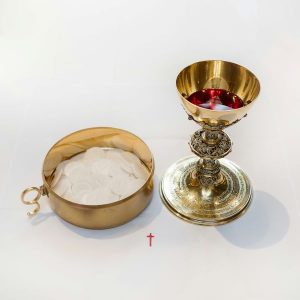 It was early years after Vatican 11 and we were only learning about the liturgical changes for celebrating the Holy Week ceremonies. Our people in the leprosy village could not go out to the parish church but we were blessed to have our own ceremonies in the village church. I especially remember one Holy Thursday. The ceremony is a very beautiful celebration of thanksgiving recalling the last supper Jesus had with His disciples, when He first gave us the Eucharist and established the priesthood before He went out to face His passion and cruel death. To set an example for those who would follow Him Jesus washed the feet of his disciples and asked them to do it in memory of Him.
It was early years after Vatican 11 and we were only learning about the liturgical changes for celebrating the Holy Week ceremonies. Our people in the leprosy village could not go out to the parish church but we were blessed to have our own ceremonies in the village church. I especially remember one Holy Thursday. The ceremony is a very beautiful celebration of thanksgiving recalling the last supper Jesus had with His disciples, when He first gave us the Eucharist and established the priesthood before He went out to face His passion and cruel death. To set an example for those who would follow Him Jesus washed the feet of his disciples and asked them to do it in memory of Him.
Our preparations included choir practices, preparing the church, the altar and finding twelve people who would have their feet washed. It was left to the village leader and his councilors to choose them. It was not an easy task. So many of the older permanent village people had bandages on their feet and others were reluctant as they thought nobody would want to wash their feet.
However, twelve of the elders were chosen and agreed, all of them men. They came early to the church to sit in their special place dressed in their best clothes. One was in a wheelchair, some were using crutches, and the rest came walking freely, but all of them with feet somehow damaged as a result of their illness. They were happy and enthusiastic at taking part.
We began the ceremony with a hymn for the feastday with drums and instruments and many voices. At the Gloria bells were rung as well and the church was filled with the sound of music. From then on however the tone changed and the drums and instruments were silent, only the human voices remained.
In the village we had people from 13 different tribal areas, each with their own language so the common language was pidgin English and we all spoke it. However, this year we had a new young priest who had not yet learnt pidgin so when it came to the homily the catechist offered to interpret for him. It was a simple, most beautiful homily about the great love that Jesus has for all of us and the example He gave of loving service, of washing the feet of his disciples. It was a lovely homily. The catechist knew his congregation, so the pidgin version was sometimes more powerful than the real English!
As the priest began the washing of the feet, he greeted each one. He took time and great care with the washing and drying. It was a very touching little ceremony. Tears came to my eyes.
The Mass continued after which the altar was stripped and we prepared to keep vigil with Jesus as He faced his passion and death.
Before the people left the church, I went to greet the men who had their feet washed. They were so excited and happy and thanking God for everything. They are such a gracious people.
One old man said to me “Sister, this our Jesus, He pass all” – meaning He’s the greatest.
by Nadia Ramoutar MMM Communications Coordinator Ireland 26.03.2024
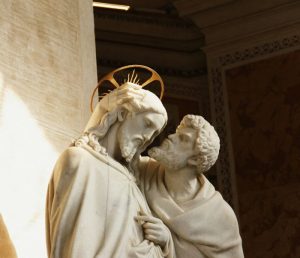 There are many parts of the Easter story that can teach us above life, love and forgiveness. Jesus is a great teacher on many things but one of the great lessons I get from him is the dignity shown in the face of betrayal. Recently, someone close to me said something very unkind. It felt like a massive betrayal and I felt my heart get very heavy and sink within me. I retreated and took the rest of the evening to be very still and quiet. What was I to do with this news? As I prayed about it a small voice whispered “nothing”. That was exactly what I did.
There are many parts of the Easter story that can teach us above life, love and forgiveness. Jesus is a great teacher on many things but one of the great lessons I get from him is the dignity shown in the face of betrayal. Recently, someone close to me said something very unkind. It felt like a massive betrayal and I felt my heart get very heavy and sink within me. I retreated and took the rest of the evening to be very still and quiet. What was I to do with this news? As I prayed about it a small voice whispered “nothing”. That was exactly what I did.
The role of Judas is essential to the Easter Story. It is interesting in the different Gospels how the translation of what Jesus said to Judas is written slightly differently. Some say that Jesus said do what you must do quickly. Some say do what you have come to do. Some say What are you about to do friend? The variation is subtle but the implication is quite great. It is clear that betrayal was something that Jesus openly predicted and observed. Can we learn that betrayal is just part of our story too? We should not expect to live a life where everyone is honest, open and just?
Without Judas, we do not have the Easter Story of Jesus.
Betrayal is part of the human experience of being alive. Very few people have never experienced it either as the one committing the betrayal or as the one who is betrayed. Perhaps it is naïve to hope to get through life without betrayal. Yet, is it also more important to build up our faith and know that when we are betrayed it is not actually about, us but about the person who is the betrayer?
We are only human after all and we don’t always have the courage to cope with the hurt people we love or care about may cause almost casually. I think there is a major sense of betrayal when human tragedy happens on a global scale like in some of the warzones around the world now. The betrayal seems so obvious to us but not so to the people committing the crimes or violence against others.
What we can learn from Jesus is to have dignity and to receive betrayal with grace. The story continues that Jesus prevents violence from taking place after his arrest and betrayal. He had no interest in retribution. Again, another powerful lesson. We do not need to pick up arms, cause harm or to strike back in anger.
The day after I felt betrayed by a loved one, I was in Church and I was praying. All of a sudden sun came through the stained glass window. I felt the warmth of it on face and I knew without a doubt that I was loved.
by Sr. Sheila Campbell MMM Ireland 24.03.2024
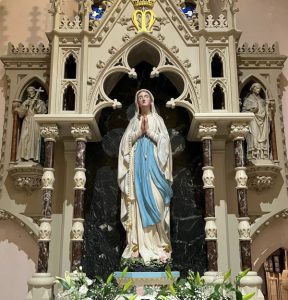 Tomorrow is the Feast of the Annunciation of our Lord also called the Feast of the Incarnation. This was Mother Mary Martin’s special feast day. When she made her vows in 1937 she took the religious name of Sr. Mary of the Incarnation. And she always kept a nativity crib in her office to remind her miracle of Christ being born a human like us.
Tomorrow is the Feast of the Annunciation of our Lord also called the Feast of the Incarnation. This was Mother Mary Martin’s special feast day. When she made her vows in 1937 she took the religious name of Sr. Mary of the Incarnation. And she always kept a nativity crib in her office to remind her miracle of Christ being born a human like us.
There is one thing that has really annoyed me for a long time. It is this image we have of Mary, the mother of Jesus, as being a sweet, passive girl. You know the images. Mary is depicted as standing, all dressed in blue or white, hands slightly lifted, eyes looking towards heaven.
The Mary in the Gospels is anything but passive. She hears of her cousin in need, and off she goes on a perilous journey to come to her help. She goaded Jesus into action at the marriage feast of Cana. She stood at the foot of the cross and watched her own son suffer a horrible death. She is a determined woman and a woman of action. So why is she shown as being so sweet and passive?
Years of patriarchy explains most of it. The role of women was downplayed, and women were “good” if they did what men told them to. Also, another part of the problem is who did the translations from the original texts into modern day English (men, mostly).
Years ago, I had a wonderful lecturer, a Redemptorist priest, in Fordham University, New York, who explained the translation problem of exactly the text: “Let it be done to me according to thy word”. These are Mary’s words of acceptance of the angel’s message that she was to become the mother of God. We translate it in a passive voice – let it be done – but the actual Greek text is much more active. It is as if Mary was punching the air and saying “Yes!”
I like to think of Mary this way. She was young, probably still a teenager by modern day standards, certainly at the beginning of her reproductive life. She would have embraced the cause with excitement, with fervour. Look at our young people today on protest marches for climate change, world peace, etc.
So today let us rejoice with Mary who took on the challenge and said “yes!”. May her positivity stir us into a similar conviction that our small actions can make a difference in our troubled world.
Early MMM Publication Nigeria 22.03.2024
Editor’s Note: Miss Murphy in this story is Lily Murphy, a long-time volunteer in Nigeria with MMM in the early days.
 Augustus sat outside his hut and stared at the rain, his whole form the picture of misery and dejection. A frog leaped close beside him and took refuge in the corner of the doorway, but Augustus paid no attention. His eyes were fixed in an unseeing stare, and he was thinking hard. He moved inside the doorway as the rain found passage through the mat roof over the balcony and came pouring down on him. It was typical wet-season rain, dancing off the path, for you know that in Nigeria the wet season means torrential rain for months at a time.
Augustus sat outside his hut and stared at the rain, his whole form the picture of misery and dejection. A frog leaped close beside him and took refuge in the corner of the doorway, but Augustus paid no attention. His eyes were fixed in an unseeing stare, and he was thinking hard. He moved inside the doorway as the rain found passage through the mat roof over the balcony and came pouring down on him. It was typical wet-season rain, dancing off the path, for you know that in Nigeria the wet season means torrential rain for months at a time.
But it wasn’t the rain that made Augustus feel sad. Oh, no, the tragedy was that he had lost Madam’s ducks. Madam, of course, is Miss Murphy, but all the schoolchildren love to call her “Ma-dam”. When Miss Murphy came back from her holiday last year the patients were so pleased to see her again that they presented her with a duck and a drake and eitght little ducks. Madam was delighted and said that when the little ducks got big, she would sell them in the market and buy scout uniforms with the money. The scouts were delighted when they head this, and Augustus was elected to look after the ducks, and he certainly looked after them very well until yesterday. Every evening at 5pm he would lock them up for the night, but yesterday evening he got so engrossed in watching the football match that he forgot all about the ducks. When he went to look for them this morning, they were gone. No wonder Augustus was so unhappy. What would Madam say? What would the scouts say when they heard that there would be no uniforms because there were no ducks?
Suddenly he moved. Rain or no rain, he must go out and search for the ducks. Everyone knew them as he had tied a piece of wire around the leg of each to distinguish them from the other ducks in the village. I wish I could tell you that Augustus put on his waterproof coat, rain hat and wellington boots before going out in the rain. But Augustus had none of these. He just broke off a large banana leaf from one of the banana trees and holding this over his head he ventured forth in search of the ducks. He went into every hut, but no one had seen Madam’s ducks. Suddenly he brightened up as he thought of the stream. Yes, they would surely be there. There had been no rain yesterday, just the burning heat of a tropical sun. Augustus usually left water for the ducks, but he had neglected that duty too. Probably the ducks had gone to the nearest stream which was almost a mile away.
Dropping his banana leaf, as the rain eased off, he hurried towards the stream, praying hard to the Virgin Mary that she would help him find the ducks. Soon his swift strides brought him in view of the stream and the sound of running water came to his ears. He lifted his head and stopped in his race as he saw advancing in line to meet him the familiar figures of Madam’s ducks.
Augustus exhaled an audible sigh of relief.
Yes, it was a wonderful day, thank God.
by Sr. Brigid Corrigan MMM England 20.03.2024
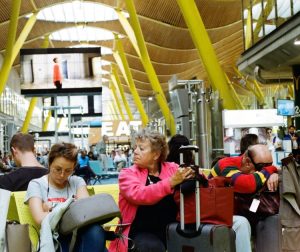 Perhaps it was during the invaluable time I spent trundling along on the Yorkshire buses through England’s beautiful countryside as a child that the seeds of a missionary vocation were sown. Then I began to savour the stillness and serenity of the woods as I peered in from the roadside when the bus halted along the way. I wondered what mystery lay within. As we bounced along the country roads, I would let my mind wander to far away places. While the wonders of life were unfolding, I’d reflect on the people I had heard about in Africa and what we had to share with one another.
Perhaps it was during the invaluable time I spent trundling along on the Yorkshire buses through England’s beautiful countryside as a child that the seeds of a missionary vocation were sown. Then I began to savour the stillness and serenity of the woods as I peered in from the roadside when the bus halted along the way. I wondered what mystery lay within. As we bounced along the country roads, I would let my mind wander to far away places. While the wonders of life were unfolding, I’d reflect on the people I had heard about in Africa and what we had to share with one another.
That was a long time ago, but the memory of those peaceful moments on my journey remains with me. Travelling has become part of life for many of us. Often, we can be so caught up with getting to our destination that the golden moments along the way may be missed. All of us can recall the chance meetings – on trains, buses, boats, or planes, which turned out to be important in our lives, and blossomed into lasting friendships. We remember too, the times of being kept waiting, be it in land rovers in Africa, waiting for the rivers to go down, or in airports for the fog to clear. At first there was frustration because we had been slowed down, but gradually perhaps we recaptured the serenity and peace of our childhood as we discovered new joys in our waiting. St. Paul, the great traveller and missionary, had many an escapade on his journeys, none more than on the journey to Rome. While shipwrecked off Malta, he used each valuable moment (Acts 28: 7-10).
Our journeys too may be filled with surprises if we allow ourselves the time. Let us pray for one another as we continue our travels in life, that setting out in faith, we will keep going, full of hope. Above all, may we return to our homes when our work is done, full of thanks and love for those we met along the way.
First published by MMM in 1986
by Sr. Sheila Campbell MMM Ireland 18.03.2024
 ‘When I give food to the poor, they call me a Saint’, mused Dom Hélder Câmara, ‘but when I ask why the poor have no food, they call me a Communist.’
‘When I give food to the poor, they call me a Saint’, mused Dom Hélder Câmara, ‘but when I ask why the poor have no food, they call me a Communist.’
This is the story of a great man who inspired me a lot when I first went to Brazil in the 1970s. He, like Mother Mary Martin, was small in stature, often looked frail but had a generous and courageous heart.
Born in 1909 in the city of Fortaleza in northeast Brazil, Hélder Câmara was the eleventh of thirteen children. Five of them had died in the terrible ‘flu epidemic which hit that region in 1905. From the beginning of his priesthood, (he was ordained a priest at a young age, 22), he devoted himself to social issues, including the reform of education. During his whole life, the struggle to defend the rights of the less privileged and marginalized, the forgotten and the excluded, shone like a beacon before him. His nickname was “bishop of the slums”.
He was influenced and encouraged greatly by Pope Paul VI, whom he first met in 1950. As soon as Dom Hélder was ordained bishop in 1952, he played a major role in the founding of the Conference of Bishops of Brazil and of CELAM, the Latin American Council of Episcopal Conferences. At the same time, he was deeply involved in the growth of the Brazilian Catholic Action, which played such an important role in the linking faith and the everyday problems of life during the time when the power of repression tightened upon the people. At the Latin American Episcopal Conferences in Medellin in 1968, and again at Puebla in 1979, his voice in favour of the world’s poor was heard. Dom Hélder has left 7,600 written meditations. More than 350 books have been published about him.
Now Dom Helder is on the road to canonisation and sainthood, but for many people, myself included, any formal process is unnecessary. He has touched our lives and taught us a valuable lesson:
“If I joyfully spend the rest of my life, of my powers, of my energies in demanding justice, but without hatred, without armed violence, through liberating moral pressure, through truth and love, it is because I am convinced that only love is constructive and strong.”
